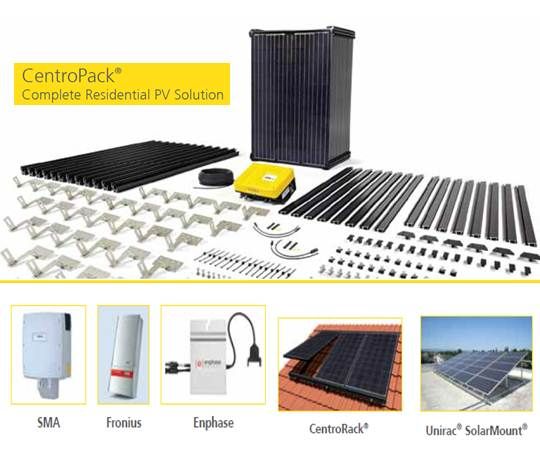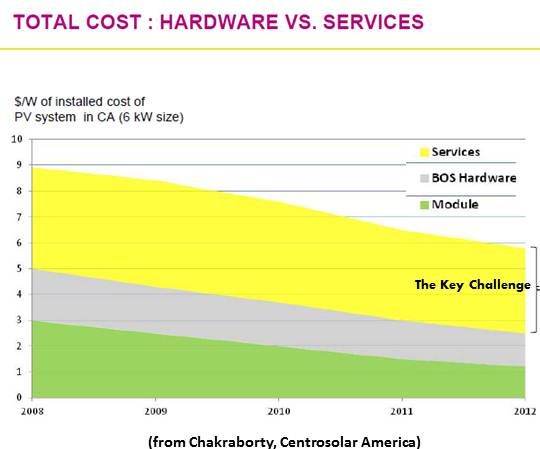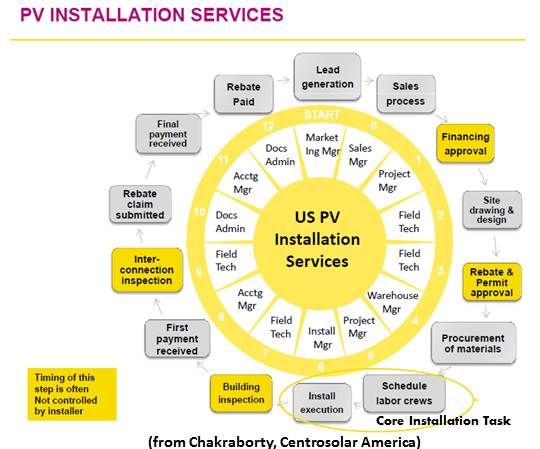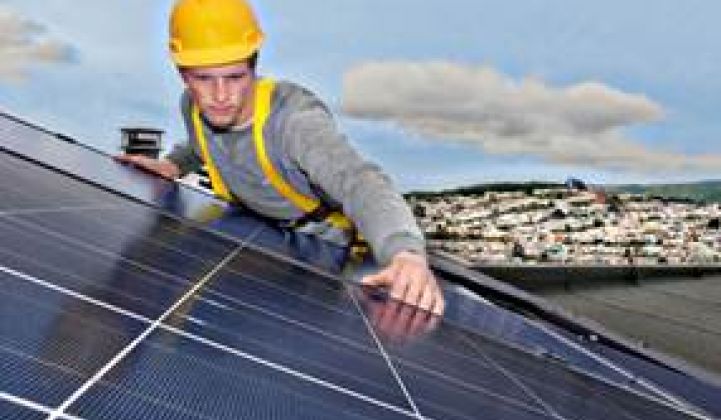Centrosolar America (PINK: CEOLF), the U.S. subsidiary of Centrosolar Group AG (ETR: C3O), is taking its parent company’s “complete solar solutions” marketing approach to new levels in its efforts to expand its U.S. presence in an intensely competitive marketplace.
If the move into the rapidly expanding U.S. market is successful, it could offset the Munich-based conglomerate’s struggle against market factors like the flood of inexpensive Chinese modules and the EU financial crisis which drove the company’s 2010 revenues of 403 million euros down to 293 million euros in 2011.
The Group’s sales volume by megawatt was up 6 percent in 1H 2012 over 1H 2011 but that gain was offset by a 38 percent drop in module price. The most recent financials suggest the company may get back to 250 million euros for the year.
“Our primary business is selling complete solar solutions, not just PV panels,” Centrosolar America Managing Director Deep Chakraborty said. “We look at ourselves as a complete systems distributor and we also manufacture some components.”
Centrosolar acquisition Renusol GmbH supplies racking systems and has recently established a U.S. subsidiary, Renusol America. Centrosolar Glass makes glass for solar panels in Germany and China.
“Seventy-five percent of our business globally is from solar system sales,” Chakraborty said, “and one-fourth is from component sales.”

To take advantage of the U.S. opportunity, Centrosolar America has, since being spun off the German parent in 2008, established a distribution system with warehousing and sales forces in the key markets of Arizona, California and New Jersey and built a network of some 400 installers. It is also preparing to enter new markets in Hawaii, Massachusetts and New York.
Soligent is probably Centrosolar's primary competitor. Formed in 2011 from the merger of solar industry veterans DC Power and Solar Depot by ITOCHU, their parent company, one estimate puts Soligent's market share at close to 30 percent. Centrosolar America, much newer to the U.S. market, has about 9 percent.
Centrosolar America and Soligent, an industry analyst explained to GTM, “package and sell modules, inverters, and balance-of-systems components, typically to installers, residential or small commercial, who aren't large enough to interface with the component suppliers directly.”
The CentroPack, Chakraborty said, “is, to our knowledge, the only complete solar kit in the market. Manufacturers have kits. They have a module, inverter and racking, the three main components. But the many other things necessary for an installation are all unique requirements that differ market-to-market.”
Centrosolar’s logistical setup and accounting and operational systems can ship and track “a typical homeowner five-kilowatt system, worth $20,000, and deliver a complete kit to the homeowner’s garage, ready for the installer.” Installers also have the option of ordering individual components, Chakraborty added.
Simplifying the installer’s buying cycle and eliminating the need for procurement and warehousing,” Chakraborty said, “is worth 20 to 30 cents per watt of soft costs improvement for the average mid-size installer.”

Taking its installer services the next step, Centrosolar America now offers third-party financing. “We have set up an online system where our solar installer customers can go out, prepare a bid for a homeowner online in five minutes,” Chakraborty explained, “and that bid is for a complete solar system -- the CentroPack -- and it’s offered for either a cash sale or, through the CentroLease, as a lease- or loan-sale.”
Like the other offerings, this is intended to eliminate installer soft costs. “The entire sales cycle for residential solar is 26 steps,” Chakraborty explained. “Our customers, the residential installers who buy through us, they have to go through those same steps. What we do is organize it into a single online system, CentroLease.com, where everything can be entered and tracked.”
All the installer has to do, Chakraborty said, “is show up at the homeowner’s kitchen table and make them a proposal.”
CentroLease was launched with ten installers in July 2011. After six successful months, Centrosolar took it statewide in California, Arizona and Hawaii at the start of 2012.
“In the first half of this year,” Chakraborty said, we achieved close to 100 percent month-on-month growth in the number of deals being sold. We are quoting at a level of over 1,000 homes per month now.”
Though Centrosolar’s closing rate is proprietary information, Chakraborty noted it is not divergent from the well-known industry standard of 10 percent to 18 percent.
The challenge now for Centrosolar is likely to be logistics. “We have to make sure we can deliver these systems on time with high quality,” Chakraborty said. “After all, this is a home goods product like HVAC or an automotive product in the garage.”
Complete solutions and one-stop-shopping are currently being offered by providers from SolarCity to Canadian Solar because, as MEMC CEO Ahmad Chatila recently told GTM, “When you own the customer, you own the price and you own the volume.” The questions now being answered in the marketplace are: Which players are positioned to take that ownership? And can the others survive?




